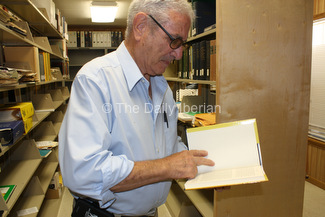One-of-a-kind
Published 11:24 am Monday, September 30, 2013

- Billy Patout shows a sections of his autobiography “Now You Know.” The autobiography is one of thousands housed in the Enterprise Sugar Library at M.A. Patout & Sons.
PATOUTVILLE – William “Billy” Patout III has been collecting books relating to the sugar cane industry for as long as he can remember, but he never imagined he would create a library with thousands of entries.
Patout, 80, is the fifth generation of his family to work in the sugar cane industry. He studied agricultural engineering at Louisiana State University and began his career in the industry at his family’s mill, M.A. Patout & Son in Patoutville, in 1956.
There he worked as an assistant engineer for three years before moving on to become an engineer for Brewer & Co. in Honolulu, Hawaii. His experience in Hawaii led to his love of collecting books, he said.
Patout, who now works as a consultant at M.A. Patout & Son, said he spent a lot of time with the Hawaiian Sugar Planters’ Association, where he would spend hours delving into sugar-related books in the association’s small library. He said he enjoyed reading about everything from the chemical side of production to the business side.
“I just found it fascinating to go into that library and look at the sugar books and read them,” he said.
As Patout’s career took him to countries around the world he began collecting books along the way, he said. He said he would visit second-hand book stores to buy books.
“Not knowing what I had I would end up with two or three of the same book,” he said. “I would walk in and say I’d take all of the sugar books on the shelf and get home and realize I had them already. I never kept records of what I bought.”
Patout also has been getting donations from people who also have been collecting books throughout the years, he said. He received a shipment of hundreds of books from a friend in Hawaii, which really boosted his personal library, he said.
Patout said he did not know what he planned to do with the collection, but a friend cautioned that if he donated it to a museum there was a possibility it could be separated or sold.
Instead, he contacted the University of Louisiana at Lafayette and began working with Charles Triche, Dean of Libraries and professor of library science, he said.
Triche said he met with Patout nearly four years ago and immediately was behind the idea of working with him to catalog his collection and form the Enterprise Sugar Library.
“I thought it was a really good collection and a really good idea to do something like that,” he said.
Patout was adamant about keeping the collection together, Triche said, so the department suggested the mill house the library to ensure it remains intact. Staff in the department then began cataloging the books and other material in the sugar library, he said.
“He liked the idea, and that’s really how the library came about,” Triche said.
The process has been interesting for the university, Triche said, and it came at an appropriate time. The university, like others throughout the state, was forced to cut funding within recent years, but the department was fortunate to stay afloat, he said.
“It’s given my staff something very, very productive to do,” Triche said. “It’s been a blessing that we’ve been able to keep our staff because we’ve had productive work for them to do with this library.”
Scholars throughout the world will be able to see what is housed in the library at the mill because of the catalog system, Triche said. The database was created through the Ohio College Library Center, which will allow various people to see the collection, he said.
The department almost is finished cataloging the books in the collection. However, there are other materials such as photographs, periodicals and research papers that need to be placed, Triche said.
“It’s a one-of-a-kind library, certainly in this region, to be associated with a university,” he said. “I think the potential for international research is tremendous. He has some very rare material in that collection.”
Triche said it was surprising and interesting to learn Patout started the collection at a young age. He said most people are not thinking of projects of that nature so young, but Patout was.
“He recognized he had something valuable there, and he started looking to see how he could make something happen and utilize it,” Triche said.
Patout and Triche agree they hope the library is utilized by students and scholars in the area who are studying and researching about the sugar cane industry. However, the books will not be able to be checked out.
“When it’s completed it’s going to be one of the largest sugar libraries in the United States. It’s a fascinating thing, and I hope it’s used,” Patout said. “It just kind of self grew.”





